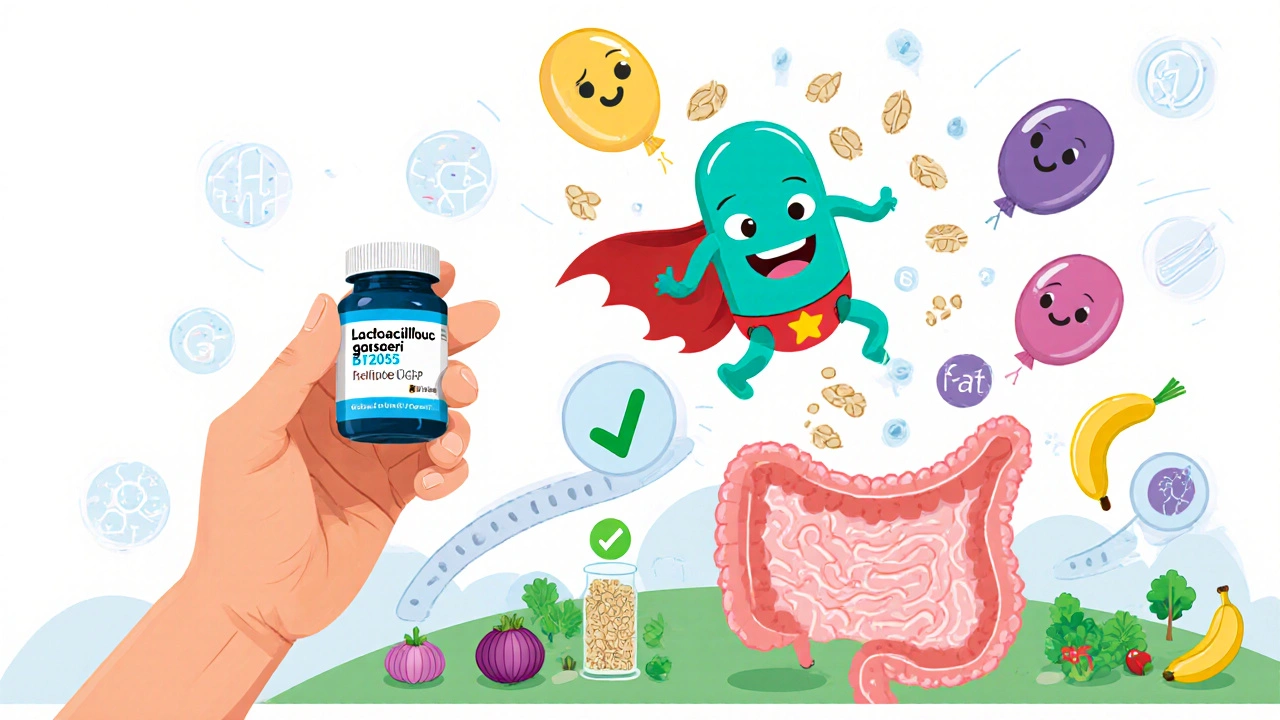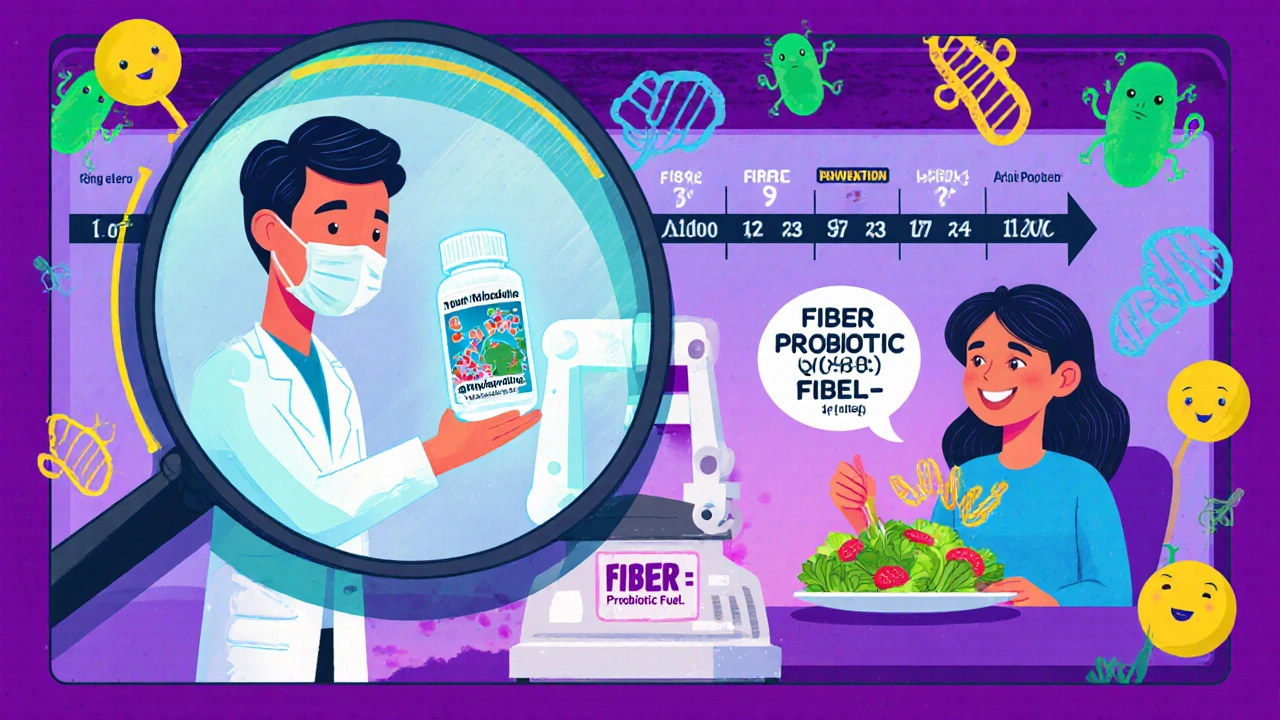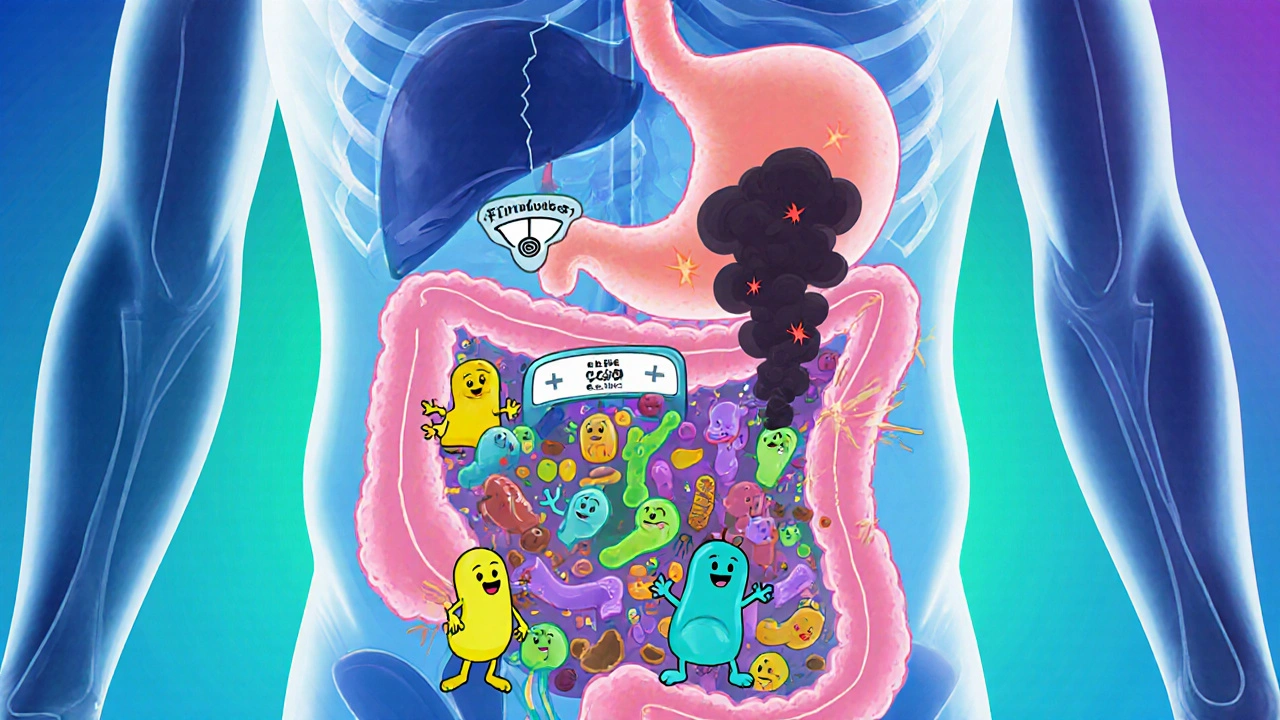What if the key to losing weight isn’t just eating less or exercising more-but fixing what’s happening inside your gut? For years, we’ve been told obesity is about calories in versus calories out. But science is now showing that the trillions of bacteria living in your intestines might be quietly shaping your metabolism, appetite, and even how your body stores fat. This isn’t science fiction. It’s real, measurable biology-and it’s changing how we think about weight management.
The Gut Microbiota: Your Hidden Metabolic Organ
Your gut is home to more than 100 trillion microorganisms, weighing about 1-2 kilograms. That’s like carrying around a small bag of bacteria inside you. These aren’t just passive tenants. They’re active players in digestion, immune function, and energy balance. And when they get out of balance, they can push your body toward weight gain. Studies going back to 2004 showed that obese people have a different mix of gut bacteria than lean people. The most consistent finding? A higher ratio of Firmicutes to Bacteroidetes. In obese adults and teens, this ratio can be as high as 2.3:1, compared to 1.7:1 in lean individuals. Why does this matter? Firmicutes are better at breaking down fiber and extracting extra calories from food. In fact, people with this microbial profile may absorb 2-10% more energy from the same meal. That’s the equivalent of eating an extra 50-250 calories a day-without lifting a fork. At the same time, obesity-linked microbiomes produce fewer short-chain fatty acids like butyrate, which help regulate inflammation and keep your gut lining intact. When that lining weakens, toxins like lipopolysaccharides (LPS) leak into your bloodstream. That triggers chronic low-grade inflammation, which is a known driver of insulin resistance-making it harder for your body to use sugar properly, leading to fat storage.Probiotics: The Fix or Just a Fad?
Probiotics are live bacteria that, when taken in the right amounts, can help restore balance in your gut. Not all probiotics are created equal. Some strains have shown real effects on weight and metabolism, while others do nothing at all. The most studied strains for obesity include:- Lactobacillus gasseri SBT2055 - In a 12-week trial, participants lost 7.9% of their visceral fat-the dangerous fat around organs.
- Lactobacillus rhamnosus GG - Linked to modest weight loss in women, especially when combined with diet changes.
- Bifidobacterium longum - Helps reduce inflammation and improve insulin sensitivity.
- Multi-strain blends - Often more effective than single strains because they work together to restore balance.
Synbiotics: The Next Level
Probiotics work better when paired with prebiotics-fibers that feed good bacteria. Together, they’re called synbiotics. A 2025 review found that synbiotic interventions led to 37% greater weight loss than probiotics alone. Why? Because probiotics need fuel to survive and thrive. Prebiotics like inulin, fructooligosaccharides (FOS), and galactooligosaccharides (GOS) help them colonize your gut longer and produce more beneficial metabolites. Synbiotics boost butyrate production by 15-25%, strengthen the gut barrier, and reduce inflammatory markers like CRP and IL-6 by up to 25%. In one 2017 study, overweight adults who took a high-dose probiotic blend plus omega-3 fatty acids saw:- 12.3% drop in total cholesterol
- 18.7% improvement in insulin sensitivity
- 24.5% reduction in CRP (a key inflammation marker)

Why Don’t Probiotics Work for Everyone?
Here’s the hard truth: probiotics aren’t a magic pill. About 45-75% of people respond, and 38% of studied strains show no effect at all. Why the inconsistency?- Baseline microbiome matters - People in Asian populations saw 22% better results than those in Western countries. Why? Their gut bacteria were already more diverse, making them more responsive to intervention.
- Diet is the silent partner - If you’re eating processed foods and sugar, probiotics can’t compete. They need fiber to survive. Without it, they die off quickly.
- Timing and duration - Most studies last only 8-12 weeks. But your gut doesn’t change overnight. Some experts believe you need at least 6 months of consistent use to see lasting effects.
- Reversibility - After stopping probiotics, 60-80% of benefits fade within 8-12 weeks. Your original microbiome tends to bounce back unless you change your lifestyle.
How Probiotics Actually Work
It’s not just about adding good bugs. Probiotics change how your body functions:- Strengthen the gut lining - They increase proteins like occludin and claudin-1 by 30-40%, reducing toxin leakage into your blood.
- Lower inflammation - They reduce TNF-alpha and IL-6, two key drivers of insulin resistance.
- Balance bile acids - They alter signaling pathways (FXR/TGR5) that affect fat storage and glucose control.
- Regulate appetite - They boost GLP-1, a hormone that makes you feel full. Some studies show a 20-30% increase in GLP-1 after probiotic use.

What the Experts Say
Dr. Susan S. Pereira from Oxford says gut microbiota manipulation is a “promising and novel treatment approach” for obesity-but we still don’t know the best dose, timing, or strain for each person. Dr. Chen Fei stresses the need for large, long-term trials. And Dr. Alvarez-Arrano points out a major flaw: most studies measure weight and blood markers, but rarely check if the probiotics actually changed the gut microbiome. The 2025 Nature meta-analysis concluded probiotics may have “no significant effect on BMI,” but that’s misleading. BMI doesn’t tell you about fat loss, inflammation, or insulin sensitivity. It’s a blunt tool. The real gains are in metabolic health-not just the scale.What You Can Do Today
You don’t need a prescription to start. Here’s what works based on current evidence:- Choose the right strain - Look for products with Lactobacillus gasseri, Bifidobacterium longum, or a multi-strain blend with at least 10 billion CFU per dose.
- Take it consistently - Daily use for at least 12 weeks. Don’t expect quick fixes.
- Eat more fiber - Aim for 30-40 grams daily from vegetables, legumes, whole grains, and fruits. Fiber is the food that makes probiotics work.
- Avoid sugar and ultra-processed foods - They feed bad bacteria and undo the benefits.
- Be patient - Changes in gut health take time. You might not feel different at first, but your metabolism is slowly shifting.
The Future: Personalized Probiotics
The next big leap? Tailoring probiotics to your unique microbiome. Researchers are already building algorithms that predict who will respond to which strain based on their gut bacteria profile. Early pilot studies are 65-75% accurate. In five years, you might get a stool test, get a custom probiotic blend, and see real, lasting results. Until then, the best approach is simple: support your gut with good bacteria, good food, and patience. Probiotics won’t replace diet and exercise-but they might be the missing piece that helps your body finally stop fighting you.Can probiotics really help you lose weight?
Yes-but not always. Clinical trials show that certain probiotic strains, especially Lactobacillus gasseri and multi-strain blends, can lead to modest weight loss (around 1.8 kg on average) and reduced waist size. However, results vary widely. About half of people see benefits, and the effect is strongest when combined with a high-fiber, low-sugar diet.
How long does it take for probiotics to work for weight loss?
Most studies show noticeable changes after 8-12 weeks. But for lasting results, you need to take them daily for at least 6 months. The benefits often fade within 8-12 weeks after stopping, so consistency matters more than intensity.
Are all probiotics the same for obesity?
No. Different strains have different effects. Lactobacillus gasseri is best for visceral fat, while Bifidobacterium longum helps with inflammation. Many products contain ineffective strains or too few live bacteria. Look for clinically studied strains with at least 10 billion CFU per dose.
Do I need to take prebiotics with probiotics?
You don’t have to, but it helps. Prebiotics feed good bacteria and make probiotics more effective. Eating fiber-rich foods like onions, garlic, asparagus, oats, and bananas gives your probiotics the fuel they need to survive and work. Synbiotics (probiotics + prebiotics) show 37% better results than probiotics alone.
Can probiotics cure obesity?
No. Obesity is a complex condition influenced by genetics, diet, activity, sleep, and stress. Probiotics are a tool-not a cure. They can improve metabolic health and support weight loss, but they work best alongside healthy eating, regular movement, and good sleep habits.
Is it safe to take probiotics long-term?
For most healthy people, yes. Probiotics are generally safe, with mild side effects like bloating or gas in the first few days. People with weakened immune systems or serious illnesses should consult a doctor first. Always choose reputable brands with third-party testing for purity and potency.


This is the kind of science that actually gives me hope. I've been fighting my weight for years, and nothing worked until I started taking Lactobacillus gasseri with a ton of fiber. Not magic, but real. My waist shrunk 3 inches in 10 weeks without changing my workout. Gut health isn't hype-it's hardware.
Stop blaming willpower. Your bacteria are running the show.
Oh great. Another ‘gut bacteria’ miracle cure from the woke wellness cult. Next they’ll tell me my colon is a spiritual guide. I’ve seen this crap since the 90s-‘probiotics fix everything!’ Meanwhile, I’m still fat and my American cheese is still delicious. Stop selling snake oil and start eating less bread.
Also, who the hell is paying for these studies? Big Yogurt?
Love this breakdown 🙌 Seriously, the difference between ‘probiotic’ and ‘effective probiotic’ is wild. I used to buy the cheapest stuff at the drugstore-zero effect. Then I switched to a 50B CFU multi-strain with inulin and… boom. Less bloating, better sleep, and my cravings for sugar dropped like a rock.
Key takeaway: it’s not the pill. It’s the pill + the salad.
Also, if you’re eating processed junk, probiotics are like throwing confetti into a hurricane. Cute, but useless.
One must observe, with profound regret, the alarming tendency of modern American health discourse to reduce complex metabolic phenomena to microbial fairy tales. The notion that a mere bacterial supplement can override centuries of evolutionary adaptation to caloric scarcity is, frankly, absurd.
One might as well claim that wearing a monocle improves insulin sensitivity. The British, for all their faults, at least still understand that food is food, and that ‘synbiotics’ are not a substitute for discipline, tea, and a good walk.
Also, 10^11 CFU? That’s more than the population of Sweden. Are we seeding our bowels or launching a microbial invasion?
My gut microbiome is basically a warzone. I’ve tried everything. Probiotics? Tried. Prebiotics? Tried. Keto? Felt like I was dying. Intermittent fasting? I cried into my oat milk latte.
Then I started eating fermented kimchi every morning. No joke. Two months later, my skin cleared up, my anxiety dropped, and I lost 8 pounds without trying. I didn’t even know I was bloated until I wasn’t anymore.
Stop buying pills. Go eat something that looks like it came from the ground, not a lab.
It is essential to note that while the data presented is compelling, it remains correlational in nature, and causation has not been definitively established across all populations. Furthermore, the heterogeneity of gut microbiomes across ethnic, geographic, and dietary strata renders universal recommendations problematic.
That said, the consistent findings regarding Lactobacillus gasseri and synbiotic synergy warrant cautious optimism. However, one must not overlook the foundational role of dietary fiber intake, which remains the most underutilized and evidence-based intervention available.
Probiotics are adjunctive, not primary. Always.
Let’s be real-most people aren’t going to take a billion bacteria daily for six months while eating kale and avoiding sugar. That’s not a lifestyle. That’s a cult.
But here’s the thing: you don’t need to be perfect. Even if you just swap one processed snack for a banana and a spoon of yogurt, you’re giving your gut a fighting chance. The goal isn’t to become a microbiome scientist-it’s to stop poisoning yourself.
And yes, I’ve seen people lose weight on probiotics. But I’ve also seen them gain it all back the second they went back to pizza Fridays. Consistency > supplements.
So maybe stop looking for the magic pill and start looking at your grocery list.
Okay, but what if I just don’t care? Like, I know I’m fat. I know my gut is trash. I know I eat too much sugar. But I also like cake. And Netflix. And my couch. And my cat. And my cat eats my cake. So why should I care about butyrate?
I’m not trying to be a ‘metabolic healer.’ I just want to not die before 50. Can I just take a pill and keep eating my donuts? Or is this one of those things where I have to ‘change my life’? Because I’m not ready for that. I’m still mad about the 2016 election.
Also, who the hell named these bacteria? Bifidobacterium? Sounds like a rejected Harry Potter spell.
As someone raised in Japan, I can confirm: our traditional diet-miso, natto, pickled vegetables, seaweed-is essentially a natural synbiotic. My grandmother never took supplements. She ate fermented foods daily. Her waistline stayed small into her 80s. She also never owned a scale.
Perhaps the real ‘probiotic’ isn’t the pill-it’s the culture. Western diets have erased this. We replaced live cultures with preservatives and sugar.
Maybe the answer isn’t more science. Maybe it’s less innovation.
What if the real problem isn’t the bacteria… but the noise?
We’re drowning in advice. ‘Eat this!’ ‘Avoid that!’ ‘Take this pill!’ ‘Do this workout!’ ‘Fasting!’ ‘Keto!’ ‘Intermittent!’ ‘Low-carb!’ ‘High-protein!’
Meanwhile, our guts are screaming under the weight of 10,000 conflicting messages.
Maybe we don’t need more fixes.
Maybe we need to stop trying to fix everything.
Just eat real food. Sit still. Breathe. Let your body remember how to be whole.
The bacteria? They’re just waiting for you to stop yelling at them.
Probiotics are a big pharma scam to make you buy more pills. The real cause of obesity? 5G radiation messing with your gut flora. They’ve been testing this since the 90s but the FDA banned the research because it would ruin the sugar industry. Also, your microbiome is being hijacked by the CIA through your smart fridge. I’ve got the receipts. Just Google ‘gut microbiome CIA’ and you’ll see.
And don’t even get me started on the glyphosate in your kale. It’s killing your good bugs. Eat organic or die. I’m not joking.
Also, I think my colon is haunted.
You speak of probiotics as if they are salvation. But salvation requires repentance. And repentance requires humility. And humility requires admitting you are not in control.
You think your willpower is sovereign? You think your choice to eat a croissant is a free act? No. Your microbiome has already decided. It has whispered to your dopamine receptors. It has rewritten your cravings in the language of bacterial quorum sensing.
You are not the master of your body. You are its host. And if you feed the wrong tenants, they will evict you-through insulin resistance, inflammation, and slow, silent decay.
So choose wisely. Not because you want to lose weight. But because you owe your bacteria better than a McDonald’s Happy Meal.
^ This. Exactly this. I used to think I was lazy. Turns out, I was just feeding the wrong bacteria. Now I eat a bowl of oats with flax and blueberries every morning. No pills. Just food. And yeah, I still eat pizza. But now I feel it. And I don’t crave it the next day.
It’s not about willpower. It’s about who’s running the kitchen.